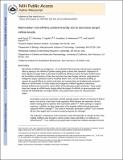Mammalian microRNAs predominantly act to decrease target mRNA levels
Author(s)
Guo, Huili; Ingolia, Nicholas T.; Weissman, Jonathan S.; Bartel, David
DownloadBartel_Mammalian microRNAs.pdf (582.1Kb)
OPEN_ACCESS_POLICY
Open Access Policy
Creative Commons Attribution-Noncommercial-Share Alike
Terms of use
Metadata
Show full item recordAbstract
MicroRNAs (miRNAs) are endogenous ~22-nucleotide RNAs that mediate important gene-regulatory events by pairing to the mRNAs of protein-coding genes to direct their repression. Repression of these regulatory targets leads to decreased translational efficiency and/or decreased mRNA levels, but the relative contributions of these two outcomes have been largely unknown, particularly for endogenous targets expressed at low-to-moderate levels. Here, we use ribosome profiling to measure the overall effects on protein production and compare these to simultaneously measured effects on mRNA levels. For both ectopic and endogenous miRNA regulatory interactions, lowered mRNA levels account for most (≥84%) of the decreased protein production. These results show that changes in mRNA levels closely reflect the impact of miRNAs on gene expression and indicate that destabilization of target mRNAs is the predominant reason for reduced protein output.
Date issued
2010-06Department
move to dc.description.sponsorship; Massachusetts Institute of Technology. Department of BiologyJournal
Nature
Publisher
Nature Publishing Group
Citation
Guo, Huili et al. “Mammalian microRNAs Predominantly Act to Decrease Target mRNA Levels.” Nature 466.7308 (2010): 835–840.
Version: Author's final manuscript
ISSN
0028-0836
1476-4687